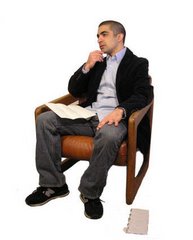I believe one can spell the word one of two ways, namely, “hippie” or “hippy,” though if you go with the latter you risk confusing it with the adjective used to describe someone with a round figure.
I have no personal recollection of the birth of the movement because at that time I was not even an idea. And I have no access through the stories of my parents, since during the 60s my father was a young man striving through school in New Delhi, and my mother was a Catholic school girl who opted for Diana Ross rather than Jefferson Airplane. She said she did a puff of marijuana once and then everything went fuzzy and she swore to never do it again. My father ate marijuana-laced papadam on a regular basis, but his eating was totally legal and never linked in any way to a communal ideology.
My knowledge of the era comes from books, TV, etc. The novelist Robert Stone thought it was a good shift from the “awful triumphalist 1950s, the American Catholic church.” He didn’t use the words “good shift,” but he seemed to mean something like it, that although the time wasn’t perfect, it at least loosened the collar of the country. Stone was my teacher and a merry prankster with Ken Kesey, although I would hesitate to call him my teacher, and would not hesitate to call him a bad teacher, a well-known writer who took the job at an Ivy League college because of the money and who really just wanted to write, not sit around with a bunch of young overachievers baring their souls for him. Looking back now I sort of don’t blame him, but his indifference still puzzles me, because although we might’ve been a little too eager, we still needed him as any student needs someone in his position.
Nonetheless he was a guy with a capacious mind and a gift for the word, and the closest I ever came to that time of itinerant living, smoking weed and taking acid and speed and any other chemical that had been vouched for by someone you knew or didn’t know, then going forth and experiencing your alternate reality perhaps by seeing Coltrane play at the Fillmore East. I think a lot of people lost their minds, and the ones that didn’t always knew that a different – possibly horrible, wonderful, disgusting, sweet – way of experiencing the world was just within their reach, that reality was essentially relative.
But the time was not just a lifestyle or aesthetic. I could probably talk about Hegel’s dialectic here, but I won’t and will just say that, from what I’ve heard and read, behind all of the strange behavior was something like a moral imperative that felt urgent and natural. The assassinations, the war, the racial struggles, the lunar landings, it was a time of condensed big events, and the closest we’ve come since in history in this country would be, well, maybe right now.
But we don’t have hippies today. People today that call themselves hippies are either old washed-up ex-hippies, or if they are young they are hippies gone limp, hippies inspired not by the injustice of their age but by the cool clothes and hairstyles of their forbears. I dated one very briefly once. She had dreadlocks and rarely showered or brushed her teeth. She was not really interested in anything other than getting high and sitting around, but she was good in bed.
Interestingly, the people in the world animated now by the same kinds of feelings of alienation, banded together by their antipathy towards the strong, are not part of this country at all, but rather are the terrorists, the insurgents of the Islamist variety, who are growing in number every day.
What I don’t understand is why there is not more of a countercultural movement in this country today, given the fact that we probably have in power one of the most militant and incompetent administrations ever. Why are we sitting back and relying on opinion polls to do the talking? Elections don’t happen often enough. Why isn’t everyone yelling on the street?
The best I can do to answer that is to quote the famous Yeats poem “The Second Coming”: The best lack all convictions, while the worst / Are full of passionate intensity. It’s a generalization, but it is one that rings true, because it is based in the patterns of history, which say that every empire must eventually fall.

